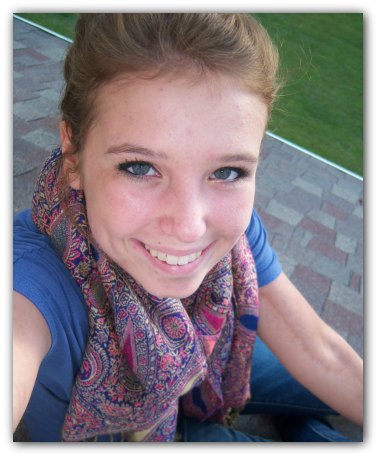|
My Voice: Caroline Dziel Sixteen-year-old Caroline Dziel, of Belchertown, Mass., is just like most other high school juniors. She's a student council member, plays sports (volleyball, skiing and softball), likes hanging out with friends and loves shopping.
CR: Tell me how you found out you had scleroderma. CD: I was 7 years old when I was diagnosed with linear scleroderma. I started noticing white patches on my skin, and it was hard for me to move my arms above my head. I went to see my pediatrician, who initially thought I had vitiligo. He sent me to a dermatologist who said that I have scleroderma. Since then, I have been working with a rheumatologist at Shriners Hospital for Children in Springfield, Mass. CR: What’s it like living with scleroderma? CD: For me, it’s nothing new. Sometimes I forget that I’m different than other people. I’m reminded a lot when people ask why my skin looks different or when I have to take my medications. At times, there can be a flood of questions. It would be nice to wake up and not have to remember to take my pills every day, or visit doctors or miss school because of appointments. Life would be so much easier without it. CR: Who do you rely on for support? CD: I really rely on my friends and my parents a lot. My friends know everything that is going on. I have to say the worst part of living with the disease is when people ask, “What’s wrong with you?” My friends are very supportive when I get sick. They make sure I feel OK and that I don’t overwork myself. My parents also sacrifice so much of their time to get me to appointments, keep up with all my medications, make sure I’m taking it, make sure the prescriptions are filled. For them, it’s the most stressful making sure everything is OK and they worry about me. They just want what’s best for me, and I appreciate all that they do for me. CR: Why do you think it’s important to get the word out about scleroderma? How do you teach people about the disease? CD: I think scleroderma, like many other diseases, isn’t well known. Many people don’t understand what’s going on. We need to educate people about scleroderma so others are more likely to support our cause. The biggest thing I can do is be honest and open. When people ask questions, I try to give them the most honest, accurate answer about what’s going on. I want people to know the truth. I have had rumors started about my skin. People have said I was in a fire or had a bad suntan. It’s easier when people just know the truth. When my friends hear something said that isn’t true about me, they speak up. Sometimes, we just laugh, though, at the stories people come up with. They can be so ridiculous. CR: Where would you like to see yourself in five years – in regards to your disease and as a young woman? CD: In five years, I hope to finish college. I’d like to go to the University of Massachusetts at Amherst, and study premed. I’d want to be a general surgeon in a trauma ER. I don’t plan to let scleroderma or being sick get in the way of my aspirations. CR: Why do you want to become a doctor? CD: All of my life, doctors have helped me and they’ve been around helping others. One day, I want to give back and help others instead of just being the one who’s being helped. This story originally appeared in the Winter 2011 issue of "Scleroderma Voice." |
|
|
Back
Understanding Scleroderma
Back
Treating Scleroderma
Back
Living Well with Scleroderma
Back
Advancing Research and Treatment
Back
Get Involved



 Caroline also lives with scleroderma. She took some time out of her busy schedule recently to chat with “Voice” editor Christina Relacion about her story.
Caroline also lives with scleroderma. She took some time out of her busy schedule recently to chat with “Voice” editor Christina Relacion about her story.